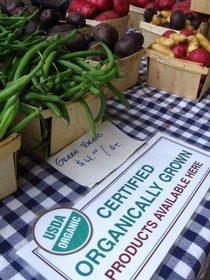 Perhaps you are a relatively new triathlete. As a result, lots of things have changed for you.
Perhaps you are a relatively new triathlete. As a result, lots of things have changed for you.
Triathlon training is a part of your daily life, you are much healthier and fit, and you pay close attention to your dietary and nutrition needs.
As it relates to what you eat, the whole issue of organic foods has probably come up. Should you be eating organic foods as a triathlete? Could doing so help your cause in training and competing in triathlons?
This post is designed to help you sort through the pros and cons of eating organic foods for yourself…
What Classifies As Organic Foods?
Organic foods are foods grown without the use of conventional pesticides and artificial fertilizers, free from contamination by human or industrial waste, and processed without ionizing radiation or food additives.
If livestock are involved, they must be reared without the routine use of antibiotics and without the use of growth hormones, and generally be fed a healthy diet.
In most countries, organic produce may not be genetically modified. Organic food production is a heavily regulated industry.
Sales & Consumption Of Organic Food
The demand for organic foods has grown by 20% annually over the last several years. Currently, organic food accounts for 1-2% of food sales worldwide.
Early consumers of organic foods would look for non-chemically treated, fresh or minimally processed food. As demand for organic foods continues rising, high volume sales through mass outlets such as supermarkets are rapidly replacing the direct farmer connection.
For supermarket consumers, product labeling, like “certified organic”, is relied on. Government regulations and 3rd-party inspectors are in place for accountability. A “certified organic” label is usually the only way for consumers to know that a processed product is “organic”. Foods claiming to be organic must be free of artificial food additives, and are often processed with fewer artificial methods, materials and conditions (no chemical ripening, no food irradiation, and no genetically modified ingredients, etc.).
Be aware of the different labels that foods receive:
-
“100% Organic” – the entire product must be produced from organic ingredients.
-
“Organic” – 95% of the product is produced from organic ingredients.
-
“Made with Organic Ingredients” – 70% of the ingredients are organic.
-
“Natural” or “All Natural” – does NOT mean organic, and there is no standard definition for this term. Any company can use this term at their own discretion.
Reasons To Buy Organic Foods
There are lots of good reasons for buying organic foods.
Organic food is known to contain 50% more nutrients, minerals and vitamins than produce that has been intensively farmed.
Organic farms are typically more aware of the ecosystems around them and operate using renewable and sustained agriculture methods. Most are very conscious of water and soil resource management, such as rotating crops and the local effects of water run off. Soil quality is a top priority of organic farming. It is believed that chemicals applied to fields compromise the natural microbiotic activity of soil which constantly breaks down organic matter and solid minerals into nutrient form a plant can then use.
An organically grown apple tree will be healthier throughout its lifespan than a conventionally grown apple tree. As a result, the organically grown plant will be able to add more complex components to all of its parts, including the fruit, resulting in an apple packed with micro-nutrients and trace minerals that are vital for human nutrition.
Organic products have a shorter shelf life, due to the lack of preservatives and pesticides. As a result, organic foods are often sold at local or community stores and markets. So buying organic often helps to support the local economy. Many proponents of organic produce enjoy knowing the people who grow their food at local markets or even at the local farm, helping to create a better understanding of farming, natural resources and the process of agriculture.
The Big Question…
It’s no secret that organic foods are more expensive than conventional foods. This is because of the laborious and time-intensive systems used by the typically smaller organic farms to produce the food.
So the 10-million dollar question is: Does the additional cost of organic food justify going organic for a triathlete?
I think most triathletes would agree that the fewer additives and chemicals they put into their body the better. Organic foods also allow the triathlete to maximize the nutrient value of what they eat. So, the question really isn’t if there is a benefit for the triathlete to eat organic foods. The issue is more one of cost.
How To Buy Organic On A Budget
What follows are some tips for going organic without going broke:
1. Be selective.
Do some research and see what foods are especially important for buying organic. It’s more or less important based on individual food items.2. Make a budget and follow it.
There are all sorts of ways you can keep organic food costs down, but the most sensible way to deal with the added expense is to take some time and make a food/grocery budget. That way, you have the piece of mind of knowing you have planned accordingly for the increased cost. If necessary, perhaps you could trim down some other lifestyle expenses to ease the pain of the added cost.3. Compare options.
Nowadays most grocery stores have an organic section. But, it may be worth it to investigate other options such as health food stores, natural food coops, or local organic food stores.< br />
4. Get creative.
Don’t forget to be creative and have fun as an organic food triathlete! Maybe you should whip up a nice organic baked potato pizza or carrot-apple bread. What about a chocolate sunrise smoothie with a green twist?



